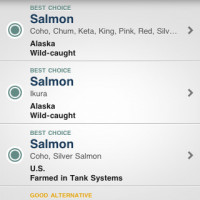A heavy-hitting group of investors including Dave McClure, Ilya Fushman, William Rosenzweig, Aki Sano and Tom Cole came together at “The New Food Chain: Investing in Food Startups” on August 10, 2011, for a discussion about the investment opportunities in the fast-growing food and technology space. The event was a combination of presentations, panels, and two-minute startup demos (all demos listed at the end of the post). It was exhilarating to hear from so many innovative food and technology entrepreneurs and, at the same event, listen to the views of investors looking to increase their investments in this space.
Physic Ventures Co-founder and Managing Director Will Rosenzweig kicked off the evening by talking about the impressive growth of the healthy food industry (7-10% CAGR, forecast to amount to $162B in 2012). Physic Ventures is a VC fund that invests in information technologies that help keep people healthy. Despite the attractiveness of the health food space, Rosenzweig also listed a lot of very real barriers to successful CPG food ventures:
- Slow consumer adoption
- Low barriers to entry (proof: 15,000 food and beverage companies entering the market each year), but a very competitive market in which to scale up
- A lack of seasoned entrepreneurs (which now seems to be changing slowly)
- Entrenched distributions systems, and the growing competitiveness of retailer private labels
- An immature venture ecosystem with a dearth of early stage VC funding for food ventures
Given these barriers to success in the manufacturing of healthy food, Physic believes there is significant opportunity in food and technology companies that enable healthy food consumption, specifically at home. Physic’s MBA intern Ella Merjanova spoke about Physic’s “Food@Home” project, with which Physic is attempting to define what our kitchens will look like and how they’ll operate in 2020. Physic also hopes to create and/or invest in the startup that will “own the kitchen of the future.”
In the food venture world, not enough attention has been paid, says Physic, to the way food is eaten at home. Of the approximately $115M invested thus far in US food technology startups, the majority has been directed to ventures in the eating-out/restaurant space. Physic is working to change that. They’ve broken down the at-home eating process into five main decisions, are mapping startup companies to each of these buckets, and are evaluating where the greatest opportunity lies.
- Defining the role of the meal (health, enjoyment, quenching hunger)
- Deciding what to eat (recipe search tools, meal-planning tools)
- Procuring food (grocery/meal delivery, growing food)
- Preparing food (learning, selling equipment)
- Eating (sharing, collaborating, and interacting with others)
Ilya Fushman from Khosla Ventures and Aki Sano of Cookpad joined Rosenzweig on an investor panel. Fushman believes the food and technology space is big, and will potentially have a huge impact on society. “We are looking for ideas that disrupt industry and that take out the middle man,” said Fushman. “We want to fund big ideas that have a technological advantage.” Aki Sano on the other hand, is looking to invest in technology that is directed at solving the societal problems of food, waste and energy scarcity.
David McLure of 500 Startups cautioned startups to be a capital effective business, and to be aware of the issues in scalability. “The barriers to entry are low,” reiterated McLure, “but it is much more difficult to scale up.” Angel investor Tom Cole also added a warning to startups: don’t overcapitalize. “If you take money from large funds, there is a lot of pressure to exit with a big sale. And maybe that is something you are not interested in.”
Another panel entitled, “Taking Lessons from Corporate Food Brands – Trends in Innovation for Startups,” featured Michael Hammer, Director of VC Strategy at Pepsico, Andrew Pederson, Global Sustainability Chocolate Manager (awesome title) at Mars. This panel focused on what big brands are doing to improve the healthfulness of their products. Michael Hammer, Director of VC Strategy at Pepsico, explained, “We’re looking of for salt reduction technologies and new crystal methods, for salt that is, not crystal meth.” Thanks for the clarification. The overall message was that big companies like Pepsi and Mars are looking for unconventional partnerships with smaller companies that can help them achieve their health and sustainability goals. What that means in the long run it is hard to say.
Chefs from Google spoke on the topic of “Corporate Wellness: Feeding Next Year’s Innovators” and continued to impress me with all the cool things they’re doing to accomplish their company-wide goal of “having the healthiest workforce on the planet by 2020.” They’re doing tons of research on their food purchasing, which has created surprising results. For example, they’ve found that buying rice bran oil from Southeast Asia is actually the most sustainable, least carbon-intensive, and lowest cost option, even though it’s not local. Google started the first “Community Supported Fishery” (CSF) to enable employees to bring home sustainable seafood to cook with their families, and they’re expanding the Community Supported Food to Go program (“Google Green Grocer”) to include grass-fed beef and produce. So cool.
Also, check out the sites of all the startups who demoed:
- Fiona from Foodspotting, which just reached 1M users the day before the event
- Brian from Shopwell, a tool which helps consumers navigate the more than 40,000 products in a typical grocery store
- Marc from HeardAbout which boasts “one delicious dish each day handpicked by passionate local foodies.”
- Kristee from Smart Gardener, enables data-driven management of your own backyard garden. The app offers a full “plot to plate experience” allowing you to identify your own particular growing season based on your exact location, manage an interactive journal, generate a weekly gardening to-do list, and deliver recipes for certain veggies right at the time you should be harvesting.
- Ahmed from Go Go Mongo, which teaches kids to eat better via an iPhone game. In the game, kids are in charge of feeding Mongo foods that make him healthy.
- Hugh from Wednesdays.com, which enables lunch and dinner clubs.
- Kenji from Yorder, a location-based mobile ordering app. The example they used is ordering concessions at a sports game from your seat so you don’t miss a minute of gametime.
- Rajat from E la Carte, makes tablets and accompanying software for restaurant tables that allow consumers to browse the menu (photos, nutritional info, sourcing of ingredients), order and customize orders, play games, draw (a la crayons on a paper tablecloth), and most importantly pay at the diner’s convenience.
- Igor from Skipola which “connects restaurants with their customers.”
A version of this post originally appeared on Edible Startups.






